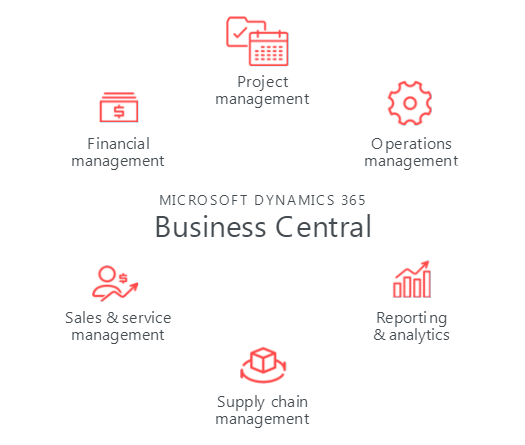In the fast-paced world of business, outdated ERP systems can significantly hinder growth and efficiency. Many businesses still rely on older versions of Microsoft Dynamics NAV and other legacy ERP systems, facing numerous pain points that stall their progress. Let’s delve into these challenges and explore how Dynamics 365 Business Central implementation can offer a transformative solution to your business.
Challenges with Legacy ERP Systems
- Older Microsoft Dynamics NAV Version Slowing Business Operations – Businesses relying on older versions of Microsoft Dynamics NAV often find that their systems can’t keep up with modern demands. Outdated software can slow down operations, leading to inefficiencies and reduced productivity.
- Legacy ERP Systems Failing to Meet Growing Business Needs – As businesses expand, their needs evolve. Legacy ERP systems often lack the flexibility to scale and adapt, leaving companies struggling to meet new demands. This can stifle growth and limit potential.
- Wasted Time on Disconnected Systems – Managing multiple systems that don’t share data is a common issue with legacy ERPs. This fragmentation leads to wasted time and effort, as employees have to navigate and integrate disparate platforms manually.
- Business Disruption from System Changes – Many businesses fear that updating or changing their ERP systems will disrupt operations and impact cash flow. This apprehension often leads to a reluctance to adopt newer, more efficient solutions.
- Rising Concerns Over Security, Data Privacy, and Compliance – In today’s digital landscape, security, data privacy, and compliance are critical concerns. Legacy ERP systems often lack the robust security measures needed to protect against the increasing threat of cyberattacks.
What is Dynamics 365 Business Central?
Microsoft Dynamics 365 Business Central is a business application designed to help small and midsized companies transform their operations. It connects finance, sales, service, and operations teams within a single, easy-to-use application. With Business Central, businesses can confidently move to the cloud, unlocking insights to adapt faster, work smarter, and perform better.
Key Features of Dynamics 365 Business Central
- Connect People, Processes, and Data: Streamline your business with a comprehensive management solution that integrates finance, sales, service, and operations.
- Eliminate Manual Workarounds: Leverage configurable workflows and built-in best practices to reduce manual effort and increase efficiency.
- Enhance Collaboration: Use Microsoft Outlook, Excel, and Teams to collaborate and share information seamlessly within the flow of work.

Benefits of Dynamics 365 Business Central
Unified Business Management Solution: Replace disconnected systems with a single, comprehensive business management solution that streamlines operations and enhances productivity.
AI-Enhanced Capabilities: With Copilot as your AI assistant, Business Central extends capabilities and empowers employees to work smarter and more efficiently.
Adaptability and Flexibility: Adapt faster with connected processes across finance, sales, service, projects, and operations. Business Central provides the agility needed to respond to changing business demands.
Interoperability with Microsoft Tools: Seamlessly integrate with Microsoft Teams, Outlook, Excel, and Word to enhance productivity and collaboration across your organization.
Data-Driven Insights: Perform better using guidance and insights within the flow of work, powered by Power BI for informed decisions and real-time analytics.
Extensive Extensibility: Extend your capabilities with the Power Platform or over 2000 purpose-built applications available on Microsoft AppSource.
Dynamics 365 Business Central Implementation – Step-by-Step Guide.
Implementing Dynamics 365 Business Central can transform your business operations by enhancing efficiency and providing valuable insights. This step-by-step guide will help you effectively plan, deploy, migrate data, and train users.
Planning Your Implementation– Begin with a comprehensive assessment of your current systems and business processes. Identify the key areas where Dynamics 365 Business Central can add value. Engage stakeholders across departments to gather requirements and set clear goals. Develop a detailed project plan outlining timelines, resources, and responsibilities
Deploying Dynamics 365 Business Central – Choose between cloud, on-premises, or a hybrid deployment based on your business needs. Set up the necessary infrastructure and ensure your hardware and software meet the system requirements. Install Dynamics 365 Business Central and configure the system according to your business processes. Leverage the customization options to tailor the solution to your specific needs.
Data Migration – Preparing your data for migration is crucial. Cleanse and organize your data to ensure accuracy and consistency. Use data migration tools provided by Microsoft to transfer your data from legacy systems to Dynamics 365 Business Central. Test the migration process in a staging environment to identify and resolve any issues before the final migration.
User Training – Effective user training is essential for successful implementation. Develop a training plan covering all Dynamics 365 Business Central aspects relevant to your users. Conduct hands-on training sessions and provide comprehensive training materials. Encourage users to explore the system and ask questions. Ongoing support and refresher training sessions will help users use the new system proficiently.
Post-Implementation Support – After deployment, monitor the system closely to ensure everything runs smoothly. Establish a support team to assist users with any issues they encounter. Gather feedback from users to identify areas for improvement and make necessary adjustments. Regularly update the system to leverage new features and enhancements.
Migrate Dynamics NAV to Dynamics 365 Business Central – Case Study
CompQsoft helped a leading manufacturing company migrate Dynamics NAV to Dynamics 365 Business Central to improve operational efficiency, business agility and save costs. Read the complete story here
CompQsoft: Your Partner in Business Transformation
CompQsoft specializes in providing end-to-end services for Dynamics 365 Business Central, from advisory to implementation to support. We help businesses navigate the complexities of digital transformation, ensuring a smooth transition to a more efficient and integrated system.
Ready to overcome the challenges of legacy ERPs and unlock the full potential of your business? Discover how Dynamics 365 Business Central can transform your operations and drive growth. Contact CompQsoft today to get started on your journey to business excellence.
